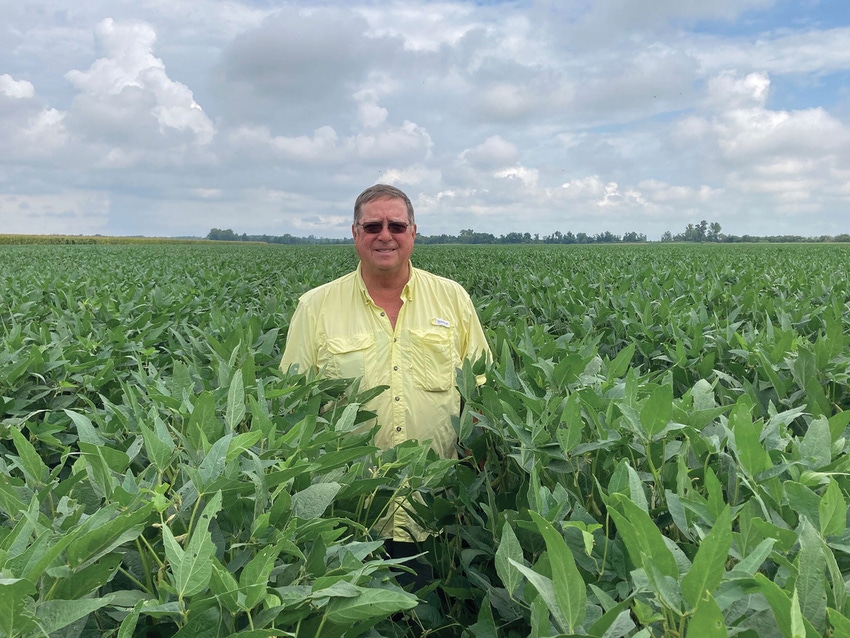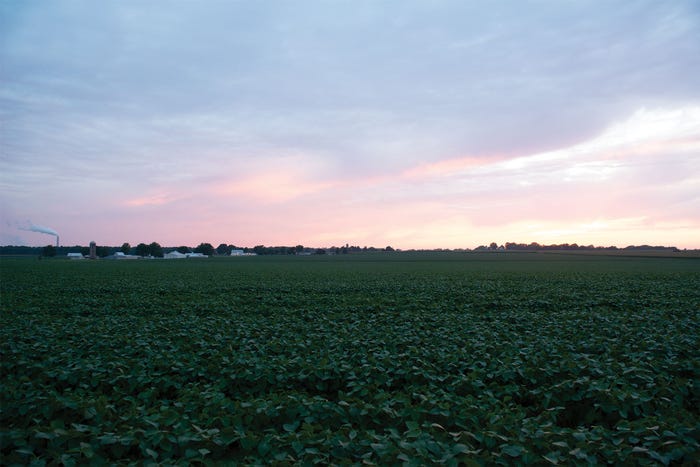October 23, 2020

Tony Bradley is finding he needs all the help he can get when he’s fighting glyphosate-resistant Palmer amaranth or pigweed in his soybeans.
Bradley, a production farmer who farms east of Jonesboro in northeast Arkansas, has been rotating corn, rice and soybeans on some of his fields so he can use a wider range of chemicals against pigweed, a problem weed for many Midsouth farming operations.
This year he planted Asgrow brand XtendFlex soybeans, which contains Bayer’s latest soybean weed management trait. Besides the built-in resistance to the glyphosate and dicamba formulations, XtendFlex beans are also tolerant to glufosinate.
“Pigweeds are a bad problem, something we’ve been fighting for a few years,” said Bradley. “We have a good rotation program with corn, rice and soybeans that helps us keep it down. We can swap up different chemicals with different modes of action in different crops. This is just an extra tool to help us fight it.
“They’ve had the Roundup and dicamba tolerance in the technology since it was introduced, but the glufosinate or Liberty trait is new.”
Bradley said he was impressed with the XtendFlex soybeans he grew for the first time in 2020. Besides the clean fields he experienced with the herbicide technology, he said he also liked the way the soybeans grew on his farm.
Because of the restrictions placed on the use of the XtendiMax, Engenia and FeXapan dicamba formulations after May 25 by the Arkansas State Plant Board, Bradley was unable to apply dicamba on his XtendFlex soybeans this year.
Late start
“It was the 21st of May or something like that before we were able to start planting,” he said, referring to the rain delays in May. “A lot of my beans are seed production, so I don’t get to plant early. We usually have to wait until after May 15. We were within a few days of the cutoff date before I could get the beans planted.”
Bradley applied Liberty and Roundup postemergence in the XtendFlex beans according to the label recommendations. He had planted LibertyLink beans last year, so he had experience with the technology.
“It worked extremely well,” he said. “The biggest thing is the timing and having experience with that last year helped. It’s very important in seed bean production to have clean fields when you get ready to harvest.”
To help with the pigweed control, Bradley applied Intimidator herbicide preemergence. Intimidator is a Loveland product that contains three compounds — S-metolachlor, fomesafen and metribuzin. Each of the herbicides has a different mode of action to work on problem weeds like pigweed.
“I put that out behind the planter,” he said. “When we made the Roundup-Liberty postemergence application, we put Zidua in with that tank mix, which gave us another residual herbicide and a different mode of action to work on the pigweeds.”
Grass control
Like many producers in the Midsouth, Bradley has also been experiencing problems with grass control. “It seems like we’re getting grasses that are more difficult for Roundup to control,” he noted. “We’ve been putting Select or generic Select products on some of our fields to help control the grass a little better.”
Volunteer rice can also be a problem. “Most of the rice I grow are hybrids, and it seems like the volunteer hybrid rice is harder to kill with Roundup, so we use a little Select to help with it,” he said. “It seems like more of this kind of stuff is getting immune to Roundup or resistant to it.”
Some insects have moved into the beans. “But we haven’t been close to the treatment threshold yet,” he said.

Bradley, who is growing his 41st crop, is no stranger to adversity like his fight with pigweeds. He started his farming career in 1979, which wasn’t a bad year itself, but preceded one which went into the record books.
“1979 wasn’t bad, but 1980 was a heck of a year,” he said. “That was one for the books. 1980 really started a big push to get things irrigated. (Temperatures hit as high as 106 degrees for several days in a row, and no rain fell across much of the Midsouth from late June to early August.)
“We had some beans that did good to make five bushels an acre, and some that didn’t get that,” he said. “Some fields weren’t even harvested.”
Almost all of Bradley’s land is irrigated now. “We have a few acres that are dryland, but almost everything else is furrow-irrigated.
Bradley expects his XtendFlex soybeans will be ready for harvest around the first of October, depending on what the weather does.
Asgrow plans to introduce 47 XtendFlex varieties across all maturity groups for the 2021 season. Besides tolerance to Roundup, dicamba and glufosinate herbicides, the varieties will also offer genetics with defensive traits that will protect against the primary soybean diseases.
About the Author(s)
You May Also Like






